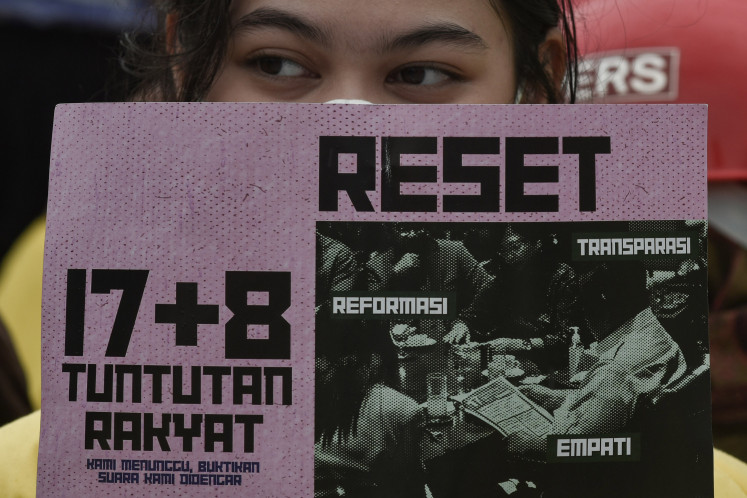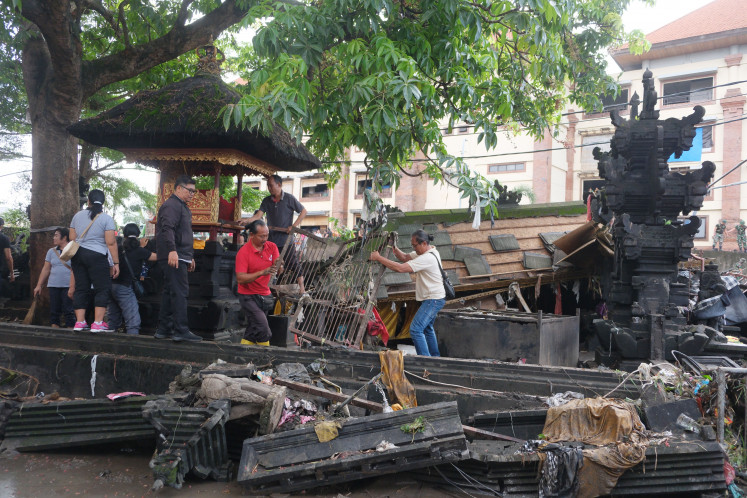Popular Reads
Top Results
Can't find what you're looking for?
View all search resultsPopular Reads
Top Results
Can't find what you're looking for?
View all search resultsNGO aims to lessen teacher shortage in remote areas
The state of education in the country’s poorest regions has prompted an NGO to launch a program that will see fresh graduates going to remote areas to take jobs as teachers
Change text size
Gift Premium Articles
to Anyone
T
he state of education in the country’s poorest regions has prompted an NGO to launch a program that will see fresh graduates going to remote areas to take jobs as teachers.
NGO Indonesia Mengajar (IM) is planning to send 50 graduates of the S1 (roughly equivalent to an undergraduate or bachelor’s degree) to teach in areas it deems as unable to fulfill primary education requirements due to a teacher shortage.
Anies Baswedan, founder of IM, said the program of sending graduates — new graduates prioritized — was aimed to overcome the lack of teachers in certain areas. “We hope [graduates sent there] will become a source of inspiration for parents to ensure their children are [well] educated also,” he said.
According to media reports, only around 41.7 percent of about 2.7 million teachers in Indonesia acquired the S1 certificate in 2008, despite it being a prerequisite to gaining a teaching license.
Education quality remains dismal in certain areas in the country. Antara newswire recently reported that one teacher, who worked in a school located in Gun Jemak village in West Kalimantan’s border area, had taught an entire primary school, consisting of six classes, for over three years from 2005 by himself.
The six classes were squeezed into three to help him carry out his teaching after three other teachers left the school because they reportedly did not feel at home there. It was only in 2009 that other teachers, at least one from the local community’s initiative, assisted him. Anies said the second purpose of the teaching program was to increase awareness among fresh graduates about the socio-economic conditions in the country.
“The second track is to prepare the Indonesian youth to become leaders in their own areas…How many officials and executives these days live with low-income people?”
Anies said IM was working with several major companies to help those who returned from their teaching experience land jobs more easily in the companies, because the graduates were assumed to have undergone an experience that would have increased their leadership skills. IM’s Evi Trisna said that this year the program was targeting to send 50 young teachers, as they were called, to five regencies in the country.
The regencies will be Tulang Bawang in Lampung, South Halmahera in North Maluku, Pasir in East Kalimantan, and Majene in West Sulawesi. “Next year, we will try to send more, about 100,” she said.
Evi said thus far, around 200 had registered for the program. These graduates will undergo a selection process, which includes an interview, a psychology test and a two-month program. They are scheduled to leave for the regencies in November.
“Most of those [who registered] are have been active in organizations and have dreams to change the nation’s education,” she said.
According to Evi, the “young teachers” will receive satisfactory salaries and health insurance. “They are allowed to extend their teaching for one year [after completing the previous year],” she said. Evi added the NGO had designated each of the five regencies to five years in the program.
Anies said the Education Ministry showed its support for the program. He added the young teachers and the program might also assist in increasing the capacity of the local teachers and educational facilities.
“But that’s not a certainty. That is the duty of the government.”










